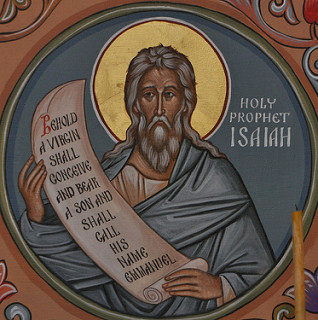Listen to an audio podcast of this post at https://www.spreaker.com/episode/v-lent-tuesday-esaias-40-18-31–59489491
Thus saith the Lord: To whom have ye compared the Lord? and with what likeness have ye compared him? 19 Has not the artificer made an image, or the goldsmith having melted gold, gilt it over, and made it a similitude? 20 For the artificer chooses out a wood that will not rot, and will wisely enquire how he shall set up his image, and that so that it should not be moved. 21 Will ye not know? will ye not hear? has it not been told you of old? Have ye not known the foundations of the earth? 22 It is he that comprehends the circle of the earth, and the inhabitants in it are as grasshoppers; he that set up the heaven as a chamber, and stretched it out as a tent to dwell in: 23 he that appoints princes to rule as nothing, and has made the earth as nothing. 24 For they shall not plant, neither shall they sow, neither shall their root be fixed in the ground: he has blown upon them, and they are withered, and a storm shall carry them away like sticks. 25 Now then to whom have ye compared me, that I may be exalted? saith the Holy One. 26 Lift up your eyes on high, and see, who has displayed all these things? even he that brings forth his host by number: he shall call them all by name by means of his great glory, and by the power of his might: nothing has escaped thee. 27 For say not thou, O Jacob, and why hast thou spoken, Israel, saying, My way is hid from God, and my God has taken away my judgement, and has departed? 28 And now, hast thou not known? hast thou not heard? the eternal God, the God that formed the ends of the earth, shall not hunger, nor be weary, and there is no searching of his understanding. 29 He gives strength to the hungry, and sorrow to them that are not suffering. 30 For the young men shall hunger, and the youths shall be weary, and the choice men shall be powerless: 31 but they that wait on God shall renew their strength; they shall put forth new feathers like eagles; they shall run, and not be weary; they shall walk, and not hunger.
Verses 18 – 20 satirize the idol maker who imagines that with his hands he can create an image of the invisible and infinite Creator of the world. Until the invisible God became visible in the Incarnation, of course, this was impossible. Now, however, we can depict the face of God when we depict the face of Christ in His icon, for the face of Christ is not simply the face of a man Jesus in whom God dwells, but rather is the face of the Logos of God, according to the human nature He assumed in the hypostatic union. The face of Jesus is not simply the face of God figuratively or morally, but is, rather, the face of God ontologically. The face of Jesus is the face of God.
Verses 21 – 28 remind man that his created mind cannot comprehend the uncreated Creator of all things. The Lord has freed us from the sort of idolatry found in pagan art, but our minds still commit the sin of idolatry when our pride convinces us that we can comprehend the infinite God, whether in His internal perfections or in His actions toward His creation. The idea that the intellect can comprehend the infinite God is the basis of the heresy of Eunomianism, which arose in the 4th century and was defeated by the wise words of the Cappadocian Fathers, especially St. Gregory of Nyssa. We are not Eunomians formally, of course, but we are acting like little Eunomians every time our intellects rise up in pride to impose the analysis of fallen reason on the judgments of God in the lives of men. If we have received the grace of the God-pleasing desire to acquire true wisdom, in order to understand His ways as far as we are truly able, we will dedicate time daily to cleansing the mind of ignorance through prayer and sacred reading, and abjure the absurd speculations fueled by the restless vanity of the limited human mind which characterize almost all discourse in the society of fallen man.
Verses 29 – 31 promise God’s all-powerful aid to those who are faithful to Him. St. Jerome gives an eschatological meaning to the promise of eagle wings, writing that it symbolizes the putting on of immortality at the general resurrection, when the blessed of the Lord will receive their spiritual bodies united to their immortal souls:
We have said that the old age of eagles is revived by a change of their wings and that they alone who see the brilliance of the sun and the radiance of its splendor are able to gaze with gleaming eyes; and they test their young ones to see whether they are of noble birth by this same test. In the same way the saints are made young again as they put on their immortal bodies so that they no longer feed the toil of mortals but are taken up into the clouds before the face of Christ, and in no way do they hunger, since they have the Lord present to them as food – St. Jerome, Commentary on Isaiah
Even now, before the Resurrection, the Lord is present to us as food in Holy Communion, a foretaste of the eternal banquet in which the saved shall neither hunger nor thirst, having Him alone as that one nourishment needed, both feeding and delighting His children unto eternity. Let us resolve to take every measure demanded to maintain the grace that we receive in His Precious Body and Blood, so that we may inherit His eternal Kingdom.

